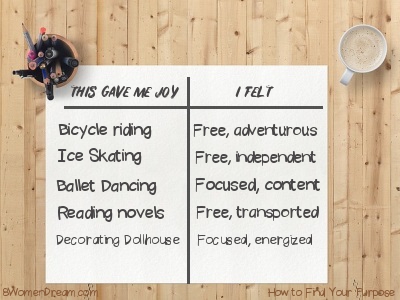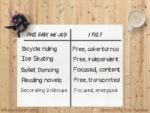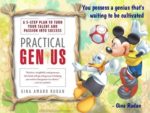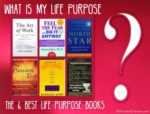Last updated on March 27th, 2023 at 01:22 pm
 It is not unusual for creative thinkers to wake up one day and wonder if there is more to life–a big dream or life purpose–or look back on times when happiness seems more accessible and satisfaction brought the days to an end.
It is not unusual for creative thinkers to wake up one day and wonder if there is more to life–a big dream or life purpose–or look back on times when happiness seems more accessible and satisfaction brought the days to an end.
Do you wonder if you will ever feel content with what you are doing with your life?
During the introspective questioning times, your subconscious attempts with all of its might to get you to do more of what you love to do, and for whatever reason, you ignore those urges.
Maybe you don’t follow your dreams because you are confused about what you’d like to do next. You aren’t sure what your big dream is or what if anything, is your life purpose. Sometimes you look at the wrong pursuits or listen to misguided feelings.
Don’t worry! This happens to many people, so I put together three steps if you are unsure you have a dream or if your vision is the right purpose. Best-selling author Barbara Sher also outlines a similar process in her book, “Live the Life You Love: In Ten Easy Step-By Step Lessons.” Follow the three steps below to find out if what you think is your life’s passion is the right dream for you.
3 Steps to Finding Your Life Purpose
STEP 1 – Quiet Contemplation
• Find a quiet place where no one will disturb you. Bring a notebook and pencil.
Allow yourself 30 minutes. If music moves your soul, put on some soft music, meditate, stretch–anything that gets your creative juices flowing.
Assisting
Your best friend can present his/her portfolio to an agent. He/she has been waiting for this opportunity for their whole life. On the day before the meeting, he/she is freaking out, thinking he/she is not good enough, not ready, can’t do it, and lacks all sense of self-esteem.
• Write down what you would do to help this friend make it to the meeting.
A favorite relative wants to learn how to paint more than anything in the world and thinks he/she might have some talent with a paintbrush. He/she has all the tools to paint – the canvas, the brushes, the paints–even the perfect room to paint in. But somehow, he/she can’t bring himself/herself into that room to paint or sign up for painting classes.
• Write down what you might say to this relative to help him/her sign up for a painting class and start painting.
A co-worker you like hates his/her job and always talks about becoming a pilot. He/she has even investigated the classes and thinks it’s too expensive, and he isn’t intelligent enough. Besides, he/she is over 45 years old–why take the risk at this stage of his/her life?
• Write down how you might help this co-worker more toward this big of a career change.
When you finish with this, read the following sentence. Please wait to read on until after you have completed the above exercise. What you answered above (how you would help these people) is how you want to be supported. You respond with your version of “being helped.” (Source: Barbara Sher)
Being Assisted
Think back to two times when you wanted to do something you thought was a great idea and talked yourself out of it. Write down at least two incidences when this happened and what was done to convince you not to move forward.
• If you could go back and assist yourself in these two situations, what would you tell yourself, and how would you handle it?
Read over your answers. Do you see a pattern forming in what your head may say to you about risk and going after a dream? Is it you or some old programming left over from your childhood that you are still listening to as an adult?
You can come to your rescue and set up situations where you ask for the support that you need. The first step is to understand that you have the power to step in and assist yourself by asking other people to do for you what you would have done to help others, as demonstrated in the above examples.
This exercise is to help you recognize where the voices in your head originate. What you tell yourself (especially the negative) often has nothing to do with who you are now. The person you are right now is capable of great things.
The homework from step 1 is to go to a bookstore, clear your mind, take a deep breath and go straight to the section of books you would read if you knew you only had one week to live (magazines can work for this exploration too).
What section would we find you in? What would you be reading? Romance novels? Travel guides? Picture books of Italy? Nature? Gardening? Marathon running? Entrepreneurial advice? Science? Mysteries? History? Famous people? Memoirs? Antiques? Arts and crafts? Car racing? Computer programming? Cooking? Camping? Fishing? Redecorating?
 Step 2 – Looking at the past
Step 2 – Looking at the past
Did you figure out where you would immediately go to a bookstore?
Let’s do another little exercise to determine why you choose to go to the same bookstore section.
• Past Loves (and NO, this is not about sex or dating)
Get out a piece of paper and a pen or pencil.
• Find a quiet place where you will not be disturbed for at least 30 minutes.
It is said that if you love and are drawn to something (not someone in this case), there is a natural, unique (and usually inborn) ability hidden there. What do you get lost in doing and why? Have you ever stopped to ask yourself this question? Some believe it is due to hidden talents you’ve ignored since your parents said you must be more practical. “Who can make a living at that!?”
• Write 1- 8 at the top of a blank page.
Under the single column titled 1-8, draw a single dividing line down the middle of this column/page.
Close your eyes and remember the things you liked to do, NO WAIT–loved to do between the ages of 1 through 8.
List these things down on the left side of your paper–no matter how stupid your adult brain might think.
You may write that you liked staring at bugs for hours, digging in the dirt for days, or riding your bike all over town. You may have loved playing with cats, climbing trees, hiding behind things, or baking with your Easy Bake Oven.
• Write everything you remember that made you happy during this time in your life.
On the right side of this page, across from each item listed, write how these things made you feel.
I found that I remembered my love for bicycle riding. I loved it because it gave me a sense of freedom, it took me to new places, it felt like an adventure, and I felt in control. I felt independent when I rode my bike.
• Write your whys (and don’t judge them) next to each item on your list.
On another sheet, do the same thing for ages 8-16; and possibly for ages 18-24 (if you were still playing at things that you loved without influence from other people).
On a final piece of paper, write a list of things you would love to do if time and money were of no concern and why.
• Do you notice any patterns forming in your answers?
I found I love feeling free. I love adventure, travel, and performing in front of people. I used to play dress up and put on performances from our fireplace. I spent years performing in ballet and my high school choir. I loved my drama and newspaper classes. I kept a daily journal. I liked getting up in class and talking in front of people. I loved being a fashion show commentator.
I’m not about to be a ballet dancer, but the standard theme I recognize in my answers is performing, followed by the second love of storytelling. And whatever I choose for myself has to allow me the feeling of freedom and adventure.
• On a final piece of paper, write the jobs or hobbies that might bring out this same sense of fulfillment and happiness.
These insights are how you realize your passions and your big dream calling.
STEP 3 – The next step
Now what?
Think about one thing you can do to take yourself one step closer to your dream. Is it to sign up for a class? Set aside $5.00 a paycheck? Begin walking three days a week? Learn golf? Join a club? Can you put this step on a list and take action toward one dream goal this week?
You can form a group for people interested in the same passions and meet once a month, or maybe there is already a Meetup group you can join following the same life passion you seek. There are thousands of groups on Facebook if you can’t yet bring yourself to step outside your front door.
It’s about finding your tribe–the people who enjoy the passions that you do so that you can be motivated to take a chance on yourself and change up your life. Being a part of a group will hold you accountable for your dream. It will also allow you to safely test the waters to see if what you believe your life purpose or passion is indeed your calling.
Catherine Hughes
(Sources are authors Barbara Sher, Elizabeth Gilbert, Steven Pressfield, for being the inspiration behind the steps chronicled here)
 |  |  |  |





